Is this freedom? Zakhe Majozi has been homeless since 2006. After years of having ‘cardboard and plastic as my home’
Every night Moses Mboweni sleeps between perfectly pruned shrubs next to a busy Pretoria intersection. “But only when it is not raining,” he says.
The space, little more than 1m in length, seems too small for the 63-year-old’s 1.7m frame. Pointing to a tiny open space between two shrubs, he says: “Ah, I just put my legs there and I can sleep okay. I know how to do these things. I am a soldier. I am trained. I can take care of myself.”
A former Umkhonto weSizwe (MK) freedom fighter, Mboweni spent seven years in exile before returning to his home in Bushbuckridge in Mpumalanga. Diagnosed with severe post-traumatic stress disorder, Mboweni found it difficult to hold down a job. For the 20 years since his last job, the father of two has been homeless.
The Military Veterans Act 18 of 2011 stipulates all the benefits military veterans are entitled to, including pension, access to healthcare and housing. Under the Act, the minister has the responsibility, “subject to available resources and any regulation”, to ensure that benefits are provided.
Zakhe Majozi is a former freedom fighter who, like Mboweni, has had to make the streets of Pretoria his home.
“My cardboard and plastics, that was my home.” He uses the past tense because he has recently managed to put together enough money to buy himself a shack. “I paid R500 for it. It is mine,” he says with pride.
Located a short walk from an abandoned building in a tiny informal settlement, the shack is little more than a wooden frame covered with canvas. The precariously built structure’s two rooms accommodates about seven or eight people.
“I invited some other homeless guys to share my shack with me, because I know what it is like to have to live on the streets,” says Majozi, who has been homeless since 2006.
Originally from KwaZulu-Natal, the young Majozi joined MK because “my family was always very poor and I always blamed apartheid for that”.
“When my mother had to leave our house to find work, I asked her, ‘Why are you leaving me like this?’ I was angry. That was why I ended up fighting the apartheid regime.”
His dream of coming back to a country in which he could enjoy the freedom he fought for was shattered as soon as he set foot back in South Africa.
“I was among the last of the MK soldiers to come back in late 1994. When we came back into the country, we were searched by the SADF [South African Defence Force]. Something clicked in me. I remember thinking, ‘Is this the freedom we fought for?’”
Vuyo Mabija was studying to be lawyer at Fort Hare when he realised “joining the struggle was a priority over and above education, because our people were dying”.
Crossing the border into Botswana in 1978, Mabija remained in exile as a freedom fighter until 1992. After his return to his hometown of Port Elizabeth, he realised “there was no home no more”.
“I discovered when I came back home that my mother had died and we had lost our family home. There was sorrow. In abundance. It was a very sorrowful time,” the 69-year-old says.
Moving to Pretoria to find employment, he soon found himself trying to survive as a casual labourer.
“I did not have a home. I became homeless because there was no home for me in Port Elizabeth and here in Pretoria I knew nobody.”
Mabija remained homeless from 1992 until late 2016 when, because of a special pension grant, he could finally afford to put a roof over his head. His impeccably neat second-floor flat in central Pretoria is a world away from the living conditions of Mboweni and Majozi. But it is furnished with little more than a single bed, a chair, a two-plate stove and a side table on which a small plastic radio is placed. “I like to listen to SAfm,” he smiles.
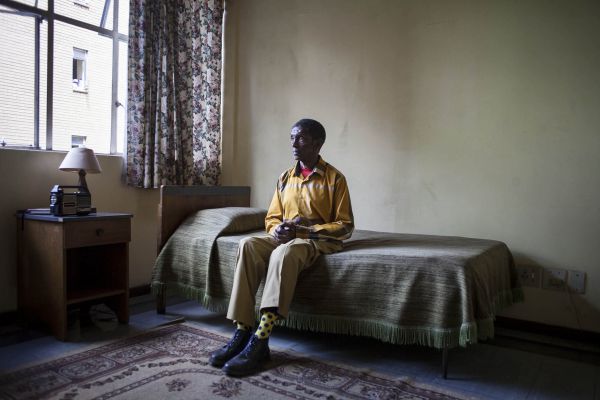
[Dreams deferred: Vuyo Mabija slept on the streets for 24 years. Although the former law student was finally able to afford low-cost accommodation in Pretoria in 2016, the situation, he says, is ‘not ideal’. (Oupa Nkosi/M&G)]
“I’m happier than what I was before. But it is still not ideal. I would appreciate, you know, a house. Just to be well accommodated in a house. To be able to enjoy a normal life.”
Sibongile Khumalo is the head of Pan African Genesis, a nongovernmental organisation that addresses the military veterans’ problems.
“Let me tell you something,” she says. “There is nothing as dangerous as an angry soldier. Because they are sitting on a powder keg that is ready to explode. These ones are calm,” she says, referring to Mboweni, Majozi and Mabija. “Those other ones that are conducting protests, they are angry.”
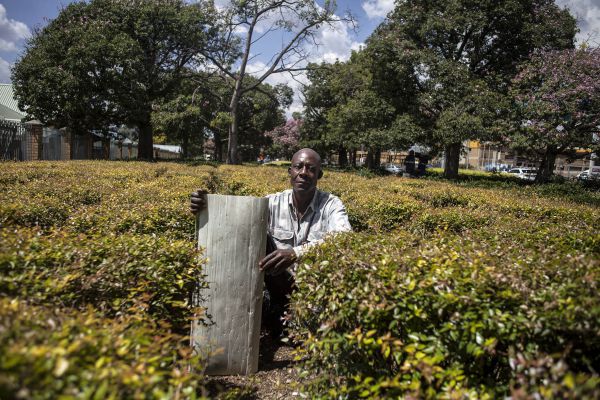
[MK veteran Moses Mboweni has been living on Pretoria’s streets for 20 years. His dream is to have a house of his own so he can take care of his children. (Oupa Nkosi/M&G)]
Anger and frustration with the slow delivery of housing for military veterans saw a group of former freedom fighters occupying the Aloe Ridge housing complex in Westgate, Pietermaritzburg, earlier this month.
Siyabonga Mndaweni is KwaZulu-Natal’s provincial chairperson of the Azanian National Liberation Army and the organiser of the occupation. A soft-spoken man, Mndaweni speaks in measured tones about the “anger and frustration” that led the 330 military veterans to occupy empty units in the low-cost housing complex.
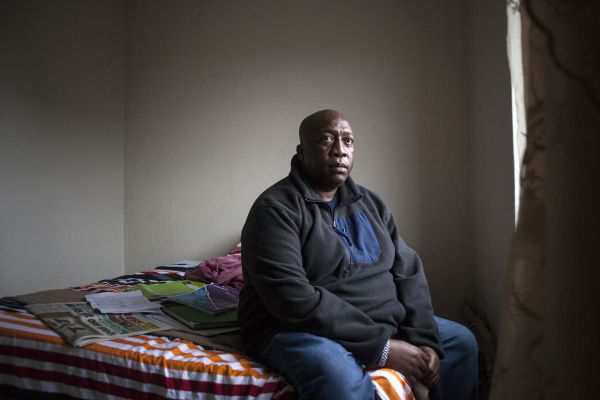
[Siyabonga Mndaweni (above) is one of the 330 homeless military veterans who occupied a low-cost housing complex in Westgate, Pietermaritzburg, earlier this month. Fellow freedom fighters Menzi Mkhize (below) is also grateful to finally have a roof over their heads, even if they have no furniture to speak of. (Oupa Nkosi/M&G)]
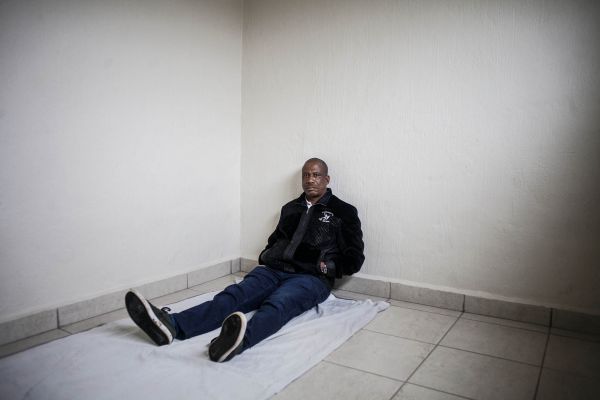
“The reason for us taking over this place is based on the reality that our government is failing us. Since 2008, the provincial government has promised that they would build houses for us; that they have secured money from the department [of military veterans]. But there has been no construction. Nothing has happened. We only have the foundations laid for 11 houses, but this region — the Umgundlovu district alone — has more than 700 members. Twenty-four years into this demo-cracy and we are still homeless,” he says.
Mthokozisi Ntuli is a former MK member who occupied one of the Aloe Ridge units. The two-bedroom flat he now lives in has nothing more than the blanket on which he sleeps, a fold-up chair and a kettle. A small packet of tea, a half-empty jar of sugar and a tub of peanut butter is all the food there is. For Ntuli, however, it is a marked improvement in his life before joining the occupation.
“For three years, I was homeless. But, luckily, because of this, I have another chance at life now. I have a shelter now.”
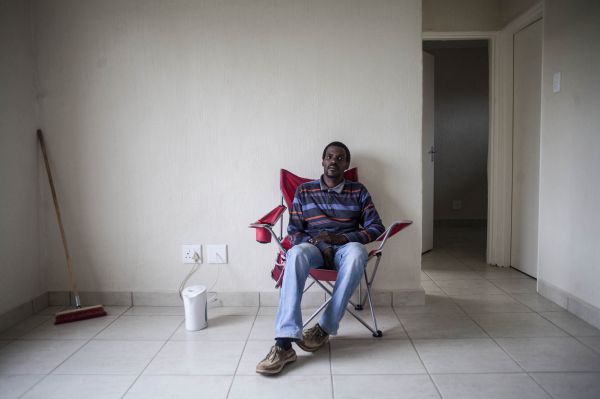
[Mthokozisi Ntuli is also grateful to finally have a roof over their heads, even if they have no furniture to speak of. (Oupa Nkosi/M&G)]
Recalling the first day he moved into his flat, Ntuli smiles. “That feeling … ja. I was over-happy. It’s hard not to have shelter. I have a daughter. I have a son. Now, I can focus on getting a job. Before it was hard, because you need to find a place to sleep.”
Pleased as he is at finally having decent shelter, the day of the occupation was “very hard”.
“There was a large number of armed police. We thought they were going to shoot us but we told them we are here for shelter, not to harm anyone. We negotiated until early that evening.
“But it was not violent. It was hard, but not violent. It was hard for us, ja, because we didn’t know what would happen. But we knew that what we were doing was not wrong, uyabon’. They could shoot us, they could hurt us but what we were doing was not wrong. Because they keep postponing, keep postponing. It’s frustrating. It’s painful. Uyabon’?”
Menzi Mkhize is the KwaZulu-Natal region-al secretary of the MK Military Veterans Association. The unit he occupies has even less furnishing than Ntuli’s. A curtain serves as his mattress. Patting his jacket, he smiles. “And every night, this is my cushion.”
Despite this, he says: “We are going to stay here until our houses are built. Once they give me the key, then I can move from this place, because I … I mean, where … where can I move? If they remove me from here, they must give me a key, show me the house that it is complete. We are not resisting to move. And we are not fighting our government. We just want the officials to fast-track the building of our houses.”
According to Mkhize, the MK vets and other organisations representing former liberation fighters have been meeting the province’s department of human settlements since 2009 in an attempt to speed up the delivery of houses.
“You know, when you walk out of a meeting, you always say it was a productive one. But then, a while later, no implementation. So we took a decision, because we were just tired of these people with their empty promises. We then targeted this area and found, ukuthi, there are lots of spaces here which are empty.
“We are veterans. Other countries have done these things for their war veterans. It’s not that we are demanding ridiculous things. No, it is our right. We left the country uneducated, angithi, because we wanted to fight for the freedom of the country. We are just frustrated.”
Kebby Maphatsoe, the deputy minister of the department of military veterans, appears to be equally frustrated.
“For us as a department the problem with providing houses for military veterans is we can’t build houses because it falls squarely on the department of human settlements to do so.”
He adds that the human settlements department provides “top-up” funds to provincial departments of human settlements to build houses for military veterans. The national department spends R110 000 per 40m2 low-cost house. The department of military veterans provides a “top-up” of R70 000 per house earmarked for former freedom fighters, allowing for a slightly bigger house (50m2) to be built.
These funds are transferred
at the beginning of each financial year based on each province’s projected spend on housing for military vets.
But, says Maphatsoe, some provinces are “just not using that money. They end up underspending, so we lose as a department because it creates a backlog for us.
“When we agree with provinces that they are going to deliver, for example, 500 houses, we put that in our annual performance plan. Come end of the financial year, only 50 houses have been built. And when you ask why, you get many excuses from the provinces; excuses that do not really stand.”
Mbulelo Baloyi, spokesperson for the KwaZulu-Natal department of human settlements, said that the main reason for the delay was that military veterans had insisted that companies belonging to them were brought in as implementing agents in the construction of these houses.
“The first 18 months is the planning stage. We could not even complete this stage because of all this to-ing and froing,” says Baloyi.
“Then, when we requested the details of these companies, they did not initially meet the necessary requirements,” he added.
Maphatsoe adds that, because “we have been taken for a ride so many times”, the department has decided to withhold the top-up funds from underperforming provinces from the beginning of this financial year “until we see the houses finished”.
The provinces that have performed well are Mpumalanga, the Free State, the Eastern Cape and Gauteng. “The rest are really not performing well,” he adds.
He says his department has not yet met Nomaindia Mfeketo, the newly appointed minister of human settlements, “because we want her to get settled into her new position”.
But his hope is to have his department ultimately take over the building of houses from human settlements.
Until then, or until the provision of houses is expedited, homeless former freedom fighters must fend — or fight — for themselves.
Forced to spend another cold Highveld winter in the Pretoria streets, Mboweni says: “Me, I don’t care about my suffering, but my children … I must take care of my children. I don’t see them because it’s a long distance for me to travel. You need money to travel. That’s why I need a house, so I can bring them to me, to my house.
“But all we hear are promises. Just promises, promises and more promises.”
Carl Collison is the Other Foundation’s Rainbow Fellow at the Mail & Guardian
